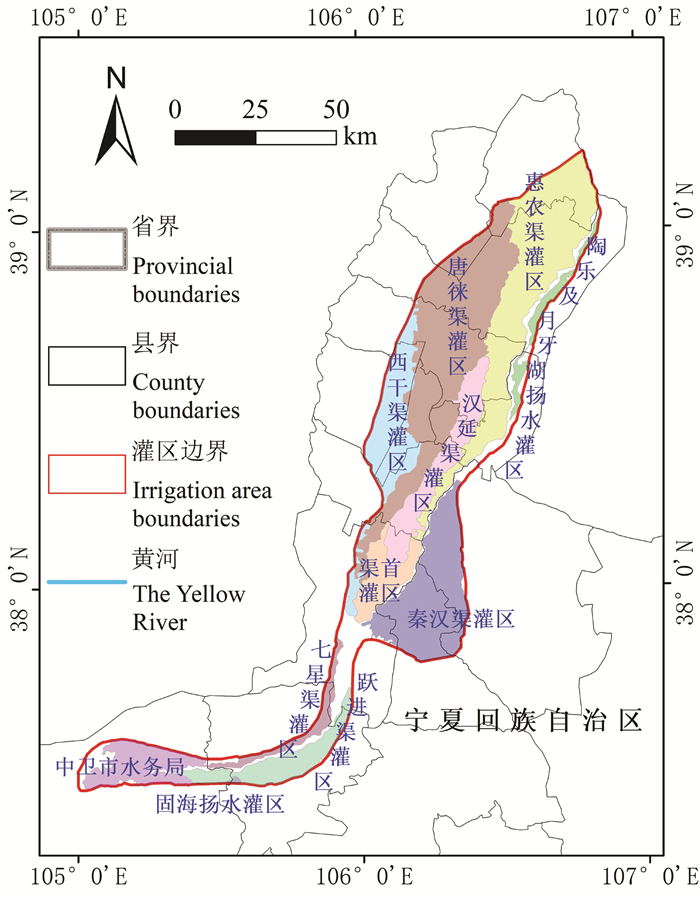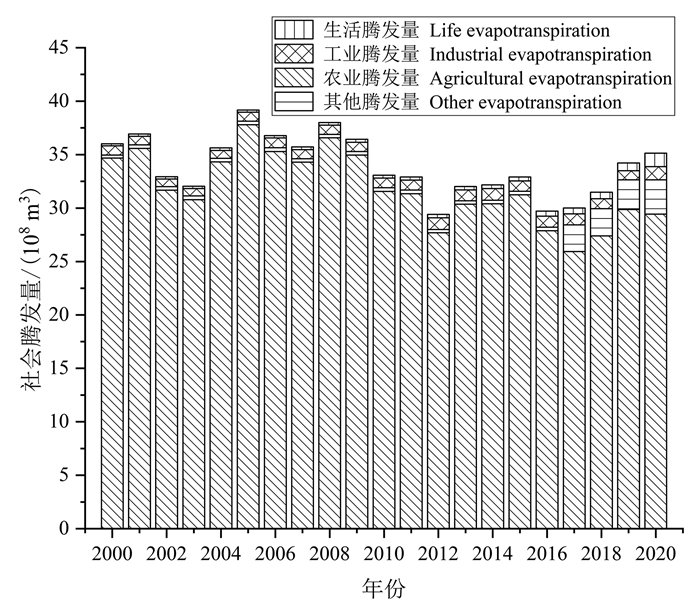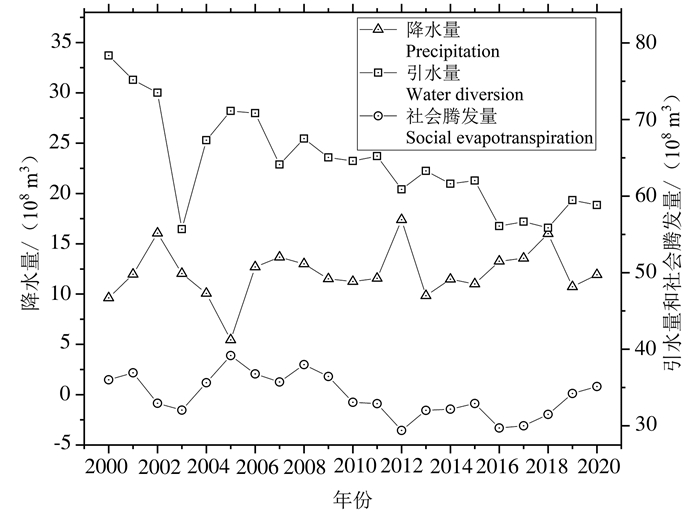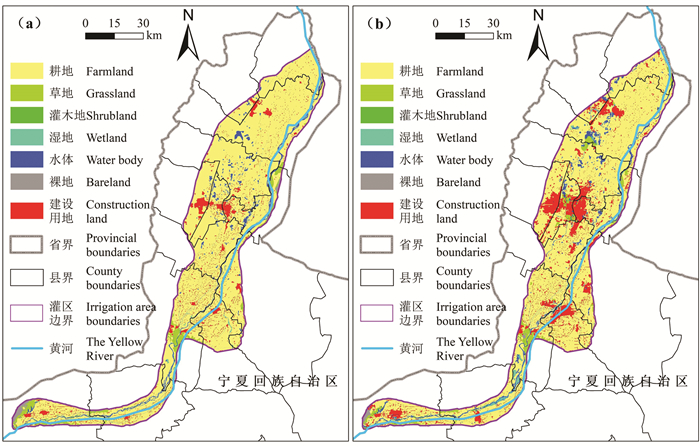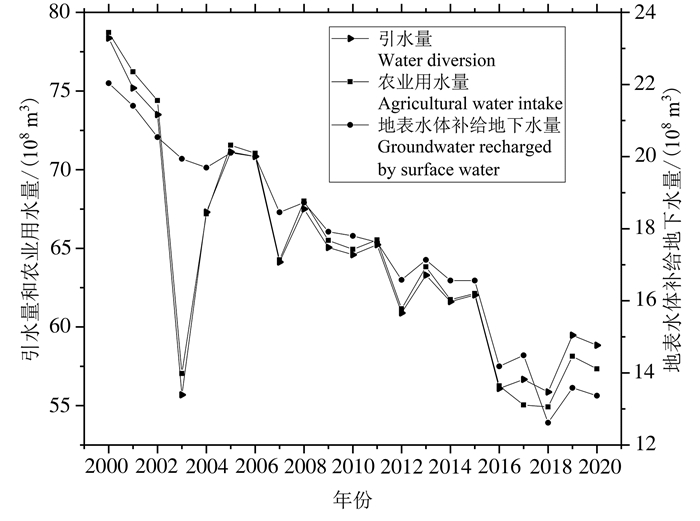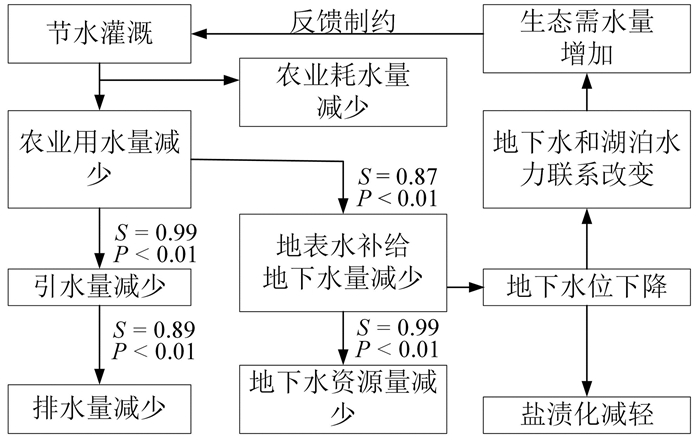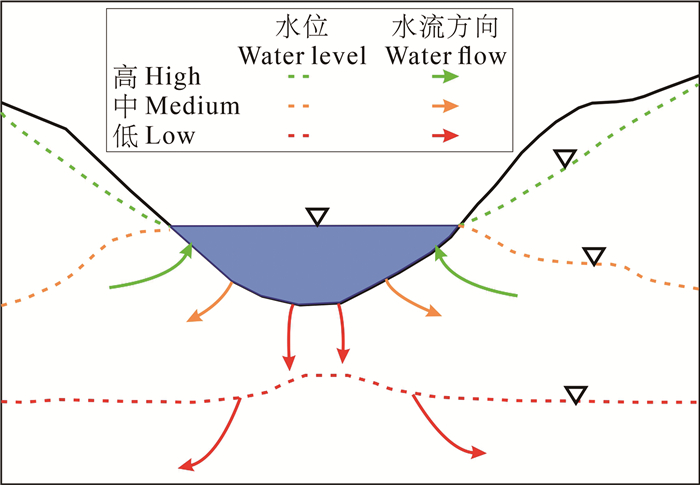Influence mechanism and ecological effect of water saving irrigation on water balance in the Yellow River irrigation area of Ningxia
-
摘要:研究目的
宁夏引黄灌区是中国重要的粮食生产基地之一,自实施节水灌溉以来,渠系衬砌、田间节水等节水工程影响了区域水平衡状况,研究节水灌溉对水平衡的影响机制及其生态效应对于区域水资源优化管理具有重要意义。
研究方法通过构建宁夏引黄灌区“水-土-气-生”多元化数据库,运用秩相关分析和Spearman相关分析方法,研究了2000—2020年宁夏引黄灌区的水平衡要素演变趋势、水平衡演化机制及其生态效应。
研究结果宁夏引黄灌区社会经济发展主要依赖过境黄河水,节水灌溉后水循环通量显著减少,2000—2020年农业用水量减少21.38×108 m3,引黄水量减少19.52×108 m3,排水量减少19.11×108 m3;节水灌溉是水平衡演化的主要驱动因子,农业用水量减少直接导致引黄水量与地表水体补给地下水资源量减少(P < 0.01);节水灌溉后地表水体补给地下水量减少8.68×108 m3,地下水资源量减少8.89×108 m3,地下水位普遍下降,盐渍化程度有所减轻,但改变了湖泊和地下水的水力联系,导致生态需水量增加。
结论节水灌溉后农业用水效率得到提高,水循环通量显著减少,地下水位下降对生态环境造成一定影响,建议以生态安全为底线进一步优化节水方案,相关研究成果为区域自然资源管理及生态保护修复提供支撑。
创新点:(1)基于水文循环要素的长时间序列资料,运用多种统计学方法,分析了节水灌溉后水平衡要素的演变趋势,厘清了节水灌溉对水平衡演化的驱动机制;(2)以节水灌溉后地下水位埋深下降为主线,分析节水灌溉对生态环境的多重影响,为区域水资源优化管理提供借鉴。
Abstract:This paper is the result of hydrogeological survey engineering.
ObjectivesThe Yellow River irrigation area of Ningxia is one of the important grain production bases in China. Since the implementation of water-saving irrigation, projects such as canal lining and field water-saving have affected the regional water balance. It is of great significance to study the influence mechanism and ecological effect of water-saving irrigation on water balance for the optimal management of regional water resources.
MethodsBy constructing the water-soil-gas-generation diversified database of the Yellow River irrigation area of Ningxia, adopting rank correlation analysis and Spearman correlation analysis methods, the evolution trend of water balance elements, water balance evolution mechanism and ecological effect of the Yellow River irrigation area of Ningxia from 2000 to 2020 were studied.
ResultsThe economic development of the Yellow River irrigation area of Ningxia mainly depends on the Yellow River water. Since the implementation of water-saving irrigation, the water circulation flux decreased significantly. From 2000 to 2020, the amount of agricultural water intake, water diversion and water discharge decreased by 21.38×108 m3, 19.52×108 m3 and 19.11×108 m3, respectively. Water-saving irrigation is the main driving factor of water balance evolution, and the decrease of agricultural water intake directly leads to the decrease of the amount of water diversion and groundwater recharged by surface water (P < 0.01). After the implementation of water-saving irrigation, the amount of groundwater recharged by surface water decreased by 8.68×108 m3, and the amount of groundwater resources decreased by 8.89×108 m3. The groundwater table decreased, and the degree of salinization reduced. In addition, the decline of the groundwater table changed hydraulic connection between lakes and groundwater, resulting in an increase in ecological water demand.
ConclusionsAfter the implementation of water-saving irrigation, the utilization efficiency of agricultural water has been improved, water circulation flux has been significantly reduced, and the decline of groundwater table has affected the ecological environment. It is suggested to further optimize the water-saving scheme based on ecological security. Relevant research results provide support for regional natural resource management and ecological protection and restoration.
-
1. 引言
鄂尔多斯盆地陕北地区长8油层组是近年来油气勘探新的后备领域,在姬塬、西峰、镇北、马岭地区都发现了大规模油藏,展示出巨大勘探前景。陕北地区长8段属东北沉积物源体系,砂体发育,储层孔隙度平均值为8.45%,渗透率平均值为0.12 × 10-3μm2,为典型的低孔超低渗致密储层(图 1),并且紧邻长7段烃源岩,在志丹一带发育长9段烃源岩,平面上油水分布关系复杂,成藏期次以及石油聚集关系不明确,长期制约着石油勘探开发。近年来不少学者对鄂尔多斯盆地长8石油成藏机理及分布规律进行了研究,区域多集中于陇东和姬塬地区,前人认为伊陕斜坡构造简单,延长组油藏主要受沉积相控制,发育岩性油藏(赵靖舟等,2006);盆地长7油层组与长8油层组之间存在的过剩压力差是油气纵向运移的主要驱动力,横向上过剩压力低值区为油气运聚成藏的有利区(楚美娟等,2013;姚泾利等,2015);把姬塬地区长8油层划分为五种成岩相,认为层序界面控制了早期的溶蚀作用和碳酸盐胶结作用(赖锦等,2014)。相比较而言,陕北地区长8研究主要包括烃源岩、低幅度构造、储盖组合、运移动力等方面(王维斌等,2017;任瑞清等,2017),石油成藏条件分析薄弱,尤其是借助流体包裹体对成藏时期各个关键时刻与油气聚集关系的分析少有涉及。
目前确定成藏时间的主要技术包括生排烃史法、油藏地球化学法、饱和压力法、流体包裹体均一温度、自生伊利石K-Ar法、Re-Os元素测年法等(刘德汉等,2007;陈梦娜等,2018),其中,流体包裹体是矿物结晶生长时,被包裹在矿物晶格缺陷的成矿流体。流体包裹体形成后,由于既没有外来物质的加入也没有自身物质的流出,因而可以作为原始的成矿流体进行研究。流体包裹体方法最初主要应用于矿床学的研究,20世纪70年代末到80年代初随着石油地球化学的发展,流体包裹体已作为一种重要的手段应用于石油地质研究,并且逐渐发展成为最广泛和最有效的手段之一。从目前的应用情况看,流体包裹体应用于石油地质研究主要有两个方面:一是根据包裹体均一温度测定数据以及捕获温度、捕获压力的计算资料,研究盆地烃源岩的热演化历史和储层的成岩演化历史;二是根据各类烃包裹体的观测分析资料,剖析油气生成—运移—聚集的成藏信息(赵桂萍,2017)。
本文利用流体包裹体分析技术,厘定了陕北地区长8成藏年代时间,结合该区热演化史和埋藏史,对油藏聚集的规律进行分析,明确了下一步勘探的主要方向。
2. 流体包裹体特征
沉积物沉积、成岩演化各阶段形成的新生矿物、矿物加大边、碎屑矿物裂隙的愈合面,以及矿物、岩石的重结晶等都可能捕获沉积、成岩环境中的介质流体,而所形成的各种包裹体记录着地质演化的历程信息。储层成岩自生矿物组构、相互包裹、穿插关系和形成时间序列,油气包裹体相态、形态、颜色、分布、均一温度和荧光特征等均记载了地质演化信息(赵彦德等,2016)。
2.1 样品采集和处理
本次研究,共选择了陕北地区中生界延长组长8的12口井32个砂岩样品,岩性主要为岩屑长石砂岩,在中国石油兰州石油地质研究所实验研究中心进行了包裹体测温。受包裹体分布的影响,在23个样品薄片中检测到了油包裹体,并对荧光光谱和均一温度进行测试。
流体包裹体透光和荧光分析在MPV-SP显微镜光度计上进行。其中,流体包裹体均一化温度测试对象主要为石英次生加大边和方解石胶结物中与油包裹体共生的盐水包裹体,若无油气包裹体,则选择盐水包裹体测量。
2.2 包裹体荧光光谱特征
目前对包裹体荧光光谱进行定量描述的参数主要有主峰波长和红绿商两种。其中,主峰波长(λmax)指最大荧光强度(Imax)所对应的发射波长,它随着小分子成分含量的增加,成熟度增大,荧光会发生明显的“蓝移”,光谱主峰波长减小;反之,光谱主峰波长增大;红绿商(QF535和Q650/500)指荧光颜色中红色部分与绿色部分的比值,可以定量化描述荧光光谱形态和结构。QF535为发射波长535~750 nm范围内的积分面积与发射波长430~535 nm范围内的积分面积之比,Q650/500为650 nm波长处荧光强度与500 nm波长处荧光强度的比值。QF535和Q650/500值越大,反映石油的成熟度越低,反之,成熟度越高(付金华等,2017)。
本次实验由于游离烃荧光强度较弱,无法进行光谱特征测试,重点对石英、长石和碳酸盐胶结物等不同宿主矿物内的包裹烃进行荧光光谱特征分析。结果表明,长石包裹体烃的主峰波长值最大,为477.2~532.8 nm,平均494.2 nm,石英包裹体烃较小,主峰波长为472.0~529.1 nm,平均为488.4 nm,碳酸盐胶结物中包裹体烃最小,主峰波长为459.3~ 488.0 nm,平均为477.0 nm。红绿商在长石包裹体中平均值为0.208,在石英包裹体中为0.194,在碳酸盐胶结物烃中为0.173(表 1)。因此,不同包裹体烃的荧光光谱主峰波长和红绿商参数变化趋势一致,长石和石英包裹体烃的数值较大且差距不大,而碳酸盐胶结物烃值最小。
表 1 陕北地区长8储集层部分包裹体荧光光谱参数特征Table 1. Characteristics of fluorescence spectrum parameters of inclusions in Chang 8 reservoir in northern Shaanxi
2.3 包裹体类型、分期
根据镜下薄片、扫描电镜等观察,陕北地区长8储集砂岩经历了多种成岩作用,压实作用中等—强压实程度,可见长石等碎屑颗粒紧密接触、颗粒定向排列或塑性岩屑变形,石英及长石颗粒的加大边现象普遍,高岭石含量较低,绿泥石分布形态以绿泥石环边、薄膜为主,长石和岩屑溶蚀普遍但发育程度不高,铁方解石及铁白云石胶结明显。研究区长8成岩序列可以概括为:压实作用→石英、长石次生加大→伊利石、高岭石沉淀→长石、岩屑溶蚀→高岭石胶结、自形石英微晶→铁方解石、铁白云石胶结(王维斌等,2017;叶博等,2018)。
在以上成岩作用序列基础上,对研究区长8储层中流体包裹体的物理相态、颜色、形态及分布情况进行镜下观察,长8储集层油气包裹体大致可分为早、晚两期,分别代表两次油气运移、成藏事件。第一期包裹体主要分布在石英碎屑颗粒的石英次生加大边以及石英颗粒内部裂隙,偏光下为褐色,无荧光或者很淡的黄色荧光,反映包裹体形成较早。第二期包裹体主要分布在切穿石英颗粒裂隙周缘,主要呈现成串的珠状定向分布,外形以椭圆或者不规则状为主。该期包裹体具有黄色荧光,荧光较强,形成时间相对较晚(图 2)。
![]() 图 2 陕北地区长8储层包裹体镜下特征a—石英加大边中气液包体,Q108,1165.2 m;b—石英溶蚀孔隙中气液包体,Q108,1165.2 m;c—石英中气液包体,Q130,1712.3 m;d—长石中浅黄色气液包裹体(荧光),Q108,1165.2 m;e—石英晚期裂隙,烃类包裹体,X94,2209.5 m;f—石英晚期裂隙,有烃类充注(荧光),X94,2209.5 m;g—石英裂隙中的包裹体,S220,2046.4 m;h—石英裂隙中有机液+盐水包裹体,X85, 1907.3 m;i—石英裂隙中气液包裹体,Q130, 1712.3 mFigure 2. Microscopic characteristics of inclusions in Chang 8 reservoir in northern Shaanxia-Gas-liquid inclusion in quartz enlarged edge, Q108, 1165.2 m; b-Gas-liquid inclusions in quartz dissolution pores, Q108, 1165.2 m; c-Gas-liquid inclusions in quartz, Q130, 1712.3 m; d-Light yellow gas-liquid inclusions in Feldspar (fluorescence), Q108, 1165.2 m; e-Inclusions in quartz fractures, X94, 2209.5 m; f- Inclusions in quartz fractures with hydrocarbon filling (fluorescence), X94, 2209.5 m; g-Inclusions in quartz fractures, S220, 2046.4 m; h-Inclusions of organic liquid and brine in quartz fractures, X85, 1907.3 m; i-Gas-liquid inclusions in quartz fractures, Q130, 1712.3 m
图 2 陕北地区长8储层包裹体镜下特征a—石英加大边中气液包体,Q108,1165.2 m;b—石英溶蚀孔隙中气液包体,Q108,1165.2 m;c—石英中气液包体,Q130,1712.3 m;d—长石中浅黄色气液包裹体(荧光),Q108,1165.2 m;e—石英晚期裂隙,烃类包裹体,X94,2209.5 m;f—石英晚期裂隙,有烃类充注(荧光),X94,2209.5 m;g—石英裂隙中的包裹体,S220,2046.4 m;h—石英裂隙中有机液+盐水包裹体,X85, 1907.3 m;i—石英裂隙中气液包裹体,Q130, 1712.3 mFigure 2. Microscopic characteristics of inclusions in Chang 8 reservoir in northern Shaanxia-Gas-liquid inclusion in quartz enlarged edge, Q108, 1165.2 m; b-Gas-liquid inclusions in quartz dissolution pores, Q108, 1165.2 m; c-Gas-liquid inclusions in quartz, Q130, 1712.3 m; d-Light yellow gas-liquid inclusions in Feldspar (fluorescence), Q108, 1165.2 m; e-Inclusions in quartz fractures, X94, 2209.5 m; f- Inclusions in quartz fractures with hydrocarbon filling (fluorescence), X94, 2209.5 m; g-Inclusions in quartz fractures, S220, 2046.4 m; h-Inclusions of organic liquid and brine in quartz fractures, X85, 1907.3 m; i-Gas-liquid inclusions in quartz fractures, Q130, 1712.3 m早期包裹体其物理相态主要有气态烃+液态烃+少量盐水、气态烃+液态烃和纯液态烃3种。气液比较大,颜色为黑色或深褐色;气态烃呈灰色,在包裹体中央部位;液态烃为黄褐色,半透明;盐水无色透明,分布在包裹体边缘。这类包裹体形态为近圆形、椭圆状,部分为不规则状,常常见于溶蚀孔隙中,沿早期裂隙呈串珠状分布,形成于沉积埋藏之后。
晚期油气包裹体物理相态主要包括气态烃+液态烃+大量盐水及气态烃+大量盐水2种。所捕获的油气包裹体较大,其包裹体形态主要为椭圆型和不规则状,多呈串珠状分布。油、气、水3种相态边界清晰可见。这类包裹体主要分布在晚成岩阶段的裂隙,同时在晚期硅质胶结物和亮晶方解石胶结物中也可见,荧光颜色较浅,反映出有机质流体中烃类含量相对较低(时保宏等,2012)。
陕北地区长8储层中的两期油气包裹体主要分布在与多期构造运动有关的构造裂隙和溶蚀孔隙中,燕山运动和喜山运动两期裂隙形成(曾联波等,2007;郭川等,2009)与当时的构造活动息息相关,而构造活动是成岩作用和油气形成以及运移成藏的主要因素。因此,两期油气包裹体分别代表了研究区两次油气运移成藏过程,油气运移与早、晚期构造活动有关(万永平等,2010;张莉等,2019)。
3. 包裹体均一温度和盐度
流体包裹体均一温度是指气-液两相流体变为单一均匀相流体时所需的温度,烃类包裹体由于甲烷的存在容易散失氢离子,从而改变包裹体的成分,造成所测的均一温度与捕获时的均一温度不同。与烃类包裹体同幕的盐水包裹体均一温度分布不仅可以用来作为古温度的近似值和热事件的标志,而且还可以用作油气成藏幕次划分的有效依据,是了解流体古温度、推测盆地古地温和热演化史的主要依据。盐水包裹体分幕依据有两点原则:一是具有相同产状和相似气/液比的流体包裹体组合;二是相似产状和相似气/液比包裹体内部均一温度大致按15℃间隔分幕(陶士振,2006)。因此,与烃包裹体共生的盐水包裹体能够提供自生矿物结晶时古地层流体的温度,利用流体包裹体均一温度作分析研究时,通常采用的都是盐水包裹体(陈刚等,2012)。
陕北地区长8储层流体包裹体类型主要包括盐水包裹体和含液态烃包裹体。本次在成岩自生矿物序次分析基础上,选取与油气包裹体相伴生的盐水包裹体测定其均一温度,以判别不同充注期形成的包裹体,测点数共计326个。统计数据后发现,储层包裹体均一化温度集中在80~140℃内(图 3),虽然分布范围较宽,但都主要存在85~105℃和115~135℃两个峰值区间,分布连续,表明油气为连续充注,整个充注过程未发生大的构造事件,而出现两个峰值说明该区烃类充注是一个由强到弱,再由弱到强的连续充注过程,为两期成藏过程(白玉彬等,2014)。
流体包裹体盐度可反映沉积时流体的环境,通常开放系统中的流体盐度要低于封闭系统中的流体盐度,它的大小是根据流体包裹体中水溶液的冰点温度来测得计算的。结果表明,长8砂岩储集层包裹体盐度总体较低,呈不对称偏态分布,一般在1%~7%,盐度整体在1%~5%,分别有2%~3%和4%~5%两个峰值区间,也进一步证明了陕北长8砂岩储层存在两期流体包裹体。同时,流体包裹体盐度变化范围较广,说明地层流体交换作用很普遍。
4. 包裹体恢复石油成藏时期
近些年来,流体包裹体广泛应用于油气成藏研究,尤其是基于流体包裹体测温与热演化史相结合间接确定油气成藏期次的研究,有力推进了油气成藏年代学的定量研究。
4.1 热演化史恢复
受区域构造演化历史的控制,陕北地区中生代经历了多期次的构造运动,构造变形与燕山运动和喜马拉雅运动密切相关。盆地东缘的基本构造形态在燕山运动期形成,受到古太平洋板块与亚洲大陆俯冲产生的远程构造效应的影响,主要表现为NW-SE向挤压作用,区内发育一系列NE-NNE走向的开阔平缓的背斜带和单斜构造;新生代以来,由于印度板块向欧亚板块的碰撞和碰撞期后的陆内俯冲所产生的远程效应,盆地东缘古构造应力场挤压方向由燕山期的NW-SE向转变为NE-SW向(王锡勇等,2010;赵振宇等,2012)。在鄂尔多斯盆地多旋回沉积与多阶段抬升改造的区域背景下,研究区中新生代经历了多期非匀速的快速沉降沉积过程与强度不等的构造抬升剥蚀事件(丁超等,2016)。
目前利用流体包裹体分析是确定油气成藏时期的主要方法,它是将包裹体测温数据投射到沉积埋藏史与古地温场演化史图上,然后进一步确定地层流体达到相应温度的地质历史时间、地质年代。
盆地热演化史控制着油气成藏时期,详细的埋藏史及热史恢复对油气成藏研究的不同方法得出的结果有限定作用,可以提高成藏期次研究的精度,使之更符合实际。地层埋藏史及其地层温度的演化过程史是包裹体定年的依据,将包裹体均一温度数据与盆地热史中温度的演化史进行对比,可以判定油气运移成藏的时间。研究区长8包裹体均一化温度主要分布在80~140℃,热演化埋藏史如图 4所示。
4.2 石油成藏时期
由包裹体均一温度分布特征来看,分布范围较宽,集中在85~105℃和115~135℃两个峰值区间,分别对应晚侏罗世—早白垩世。陕北地区主要发育长7烃源岩,从热演化历史的模拟结果看,侏罗纪晚期—白垩纪早期延长组烃源岩的 Ro值接近0.7%,达到生烃门限,可以大规模生烃。将构造演化史同油气包裹体宿主矿物与均一温度、Ro值结合起来,参照任战利等(2007)测定的鄂尔多斯盆地古地温梯度3.68℃/100 m和地表温度15℃计算,得出研究区延长组长8应为连续一期两幕成藏。结合长8地层埋藏−热演化史图,推测长8储层包裹体形成时间距今135~110 Ma,对应的地质时间为早期充注时间的晚侏罗世和大规模充注期的早白垩世两个时期,这也与前人对于鄂尔多斯盆地延长组油气成藏时期的研究相吻合(任战利,1996;柳益群等,1997)。
5. 石油成藏模式
成藏模式是对具有代表性油藏特征的油气成藏作用充分而且高度的概括与归纳,在同一成藏模式中的油藏应该具有相似的成藏作用和成藏特征。成藏模式是在充分解剖典型油气藏、明确油藏形成条件和成藏特征的基础上建立的,对指导下一步勘探方向具有启示意义。
陕北地区成藏地质条件主要包括烃源岩展布与厚度、剩余压力、沉积砂体、储层物性、顶面构造等因素(陈世加等,2012;王奇等,2018),如果各成藏地质条件及生油关键时刻配置良好,就能形成有利的油气富集区。由以上埋藏和热演化史分析可知,陕北地区在早白垩世最大生排烃阶段构造相对稳定,生成的油气不易被后期构造破坏,是形成大型油气藏的有利条件,因而影响该区石油富集的最主要的因素为烃源岩、储层及充注动力等因素。本次从烃源岩出发,以包裹体充注时间为纽带,以输导体系为重点,建立陕北地区长8石油成藏模式。
烃源岩是油气生成的物质基础。鄂尔多斯盆地三叠系延长组长7、长9暗色泥岩为该区主要烃源岩(图 5),长9烃源岩在志丹一带局限分布(师磊等,2011)。两种烃源岩相比较,最有利的生烃来源仍然是长7,其有机母质类型为Ⅰ~Ⅱ1型,有机质丰度4.10%~9.23%,镜质体反射率Ro为0.8~1.4,处于成熟阶段,厚度为10~35m,具有机质丰度高、类型好的特征。研究区长8油藏是最有利于石油富集的层位,其分布主要受生烃中心的展布以及厚度控制,即距长7生烃中心越近,成藏越好,越远则越差,长7、长9泥岩厚度分布在平面存在差异,因此暗色泥岩厚度大的地区往往是有利的勘探目标区。
![]() 图 5 陕北地区长7、长9烃源岩与长8油藏分布图(据任瑞清等,2017)Figure 5. Source rock distribution in Chang 7 and Chang 9 and reservoir distribution in Chang 8 in northern Shaanxi (modified from Ren Ruiqing et al., 2017)
图 5 陕北地区长7、长9烃源岩与长8油藏分布图(据任瑞清等,2017)Figure 5. Source rock distribution in Chang 7 and Chang 9 and reservoir distribution in Chang 8 in northern Shaanxi (modified from Ren Ruiqing et al., 2017)延长组长8为三角洲沉积体系,三角洲前缘水下分流河道砂体和三角洲平原分支河道砂体发育,局部砂体具有厚度大,连片性强的特点。储层特征也是制约石油聚集的关键因素,其主要受沉积环境的控制,现今陕北地区长8砂岩储层压实和胶结作用是储层致密化的重要原因。结合埋藏史,从晚侏罗世研究区进入快速埋深压实阶段,原生孔隙迅速降低,在早白垩世埋深达到最大。长7、长9烃源岩生成的石油选择物性相对较好的储层聚集成藏。通过统计,吴起地区砂岩储层平均孔隙度为8.9%,渗透率平均为0.25×10-3μm2,高桥—西河口地区储层平均孔隙度为7.2%,渗透率平均为0.16×10-3 μm2,前者工业井明显多于后者,很好地验证了以上由于储层物性变化明显,油气差异聚集的结论。
从油包裹体分析来看,研究区砂岩储层普遍具有含油气荧光显示,只是荧光颜色有区别,反映了油气充注强弱不同。本文利用含油包裹体颗粒指数(GOI=含油包裹体颗粒数/颗粒总数×100%)对陕北地区长8充注程度进行了分析,该指数用于识别古油藏及石油运移路径等,储层石油包裹体丰度大于5%则为油层或古油层,小于5%为低充注或主要输导层(陈梦娜等,2018)。由于样品数量限制,只对7个含油包裹体样品做了GOI分析,其中有3个GOI值大于5%,都分布在吴起一带,说明该区总体石油充注强度较大,但在其他地区GOI值小于5%,分析认为可能是由于距离长7主力烃源岩远,长9生烃能力有限,储层非均值影响,石油充注程度不高,长8储层中滞留大量地层水,测试过程中往往产水(图 6)。
鄂尔多斯盆地中生界延长组砂岩主要为低渗透储层,前人通过对运移动力的研究,认为影响该区油气大规模成藏的主要动力为由于泥岩欠压实作用形成的过剩压力(楚美娟等,2013;姚泾利等,2015),长7烃源岩生成的油气在过剩压力驱动下,通过近源叠置的砂体和周围裂缝向下运移至长8砂岩储层成藏,甚至运移至下覆长9、长10地层。在典型油气藏解剖的基础上,综合油藏分布、类型、输导体系、充注程度等因素,认为长8原油主要富集在邻近烃源岩的相对高孔高渗的水下分支河道、河口坝等砂体中,其中西部(吴起—顺宁)长8原油来自上覆长7烃源岩,东部(志丹—高桥)长8原油主要来自于原地下伏长9烃源岩,具有“双源供烃,差异聚集”的成藏特点(图 7)。
6. 结论
(1)长8砂岩储层中的流体包裹体主要分布于细砂岩的石英加大边或裂隙中,以气液烃包裹体、气液两相盐水包裹体为主,可分为早、晚两期,与气液烃包裹体伴生的盐水包裹体均一温度主要存在85~105℃和115~135℃两个峰值区间,分布范围广,油气为连续充注。
(2)陕北地区长8石油充注的主要时期为110~135 Ma,分别为晚侏罗世的早期充注和早白垩世的大规模充注两个时期。主要发育长7烃源岩,晚侏罗世—早白垩世期间延长组烃源岩的Ro值均接近1.0%,达到生烃门限,可以大规模生烃,长9烃源岩在志丹地区局部分布。
(3)陕北长8油藏受烃源岩、储层及充注动力等因素控制,发育岩性油藏,在平面上分布不均匀。西部吴起—顺宁地区长8含油包裹体颗粒指数GOI值多大于5,油藏相对东部志丹—高桥地区分布更多,区域上具有“双源供烃、差异聚集”的成藏特点。
-
图 7 湿地地表水-地下水交互模式简图(据罗杰,2020修改)
Figure 7. The interaction model between surface water and groundwater in wetland (modified from Luo Jie, 2020)
表 1 宁夏引黄灌区水平衡要素的Spearman相关系数
Table 1 Spearman correlation coefficients of water balance elements in the Yellow River irrigation area of Ningxia

表 2 宁夏引黄灌区水平衡要素变化
Table 2 Changes in water balance elements in the Yellow River irrigation area of Ningxia

表 3 2000—2020年土地利用转移矩阵
Table 3 Land-use transfer matrix from 2000 to 2020

-
Beran A, Hanel M, Nesládková M, Vizina A, VyskočP, Kožín R. 2019. Climate change impacts on water balance in western Bohemia and options for adaptation[J]. Water Science and Technology, 19(1/2): 323-335.
Chen Sheming, Liu Futian, Zhang Zhuo, Zhang Qian, Wang Wei. 2021. Changes of groundwater flow field of Luanhe River Delta under the human activities and its impact on the ecological environment in the past 30 years[J]. China Geology, 4(3): 455-462.
Fan G, Zhang D, Zhang J, Li Z, Sang W, Zhao L, Xu M. 2022. Ecological environmental effects of Yellow River irrigation revealed by isotope and ion hydrochemistry in the Yinchuan Plain, Northwest China[J]. Ecological Indicators, 135: 108574. doi: 10.1016/j.ecolind.2022.108574
Gan Yueyun, Wang Kaiyan, Gan Shengwei. 2019. Analysis of the water balance in the Taihu Basin in recent years[J]. Journal of China Hydrology, 39(1): 89-92 (in Chinese with English abstract).
Guo Shushu. 2018. Study on Spatiotemporal Evolution and Regulation of Soil Salinization in Hetao Irrigation Districe, Inner Mongolia, China Using Remote Sensing and CLUE-S Model[D]. Beijing: China Inestitute of Water Reources and Hydropower Research, 1-124 (in Chinese with English abstract).
Han Shuangbao, LI Fucheng, Wang Sai, LI Haixue, Yuan Lei, Liu Jingtao, Shen Haoyong, Zhang Xueqing, Li Changqing, Wu Xi, Ma Tao, Wei Shibo, Zhao Minmin. 2021. Groundwater resource and eco-environmental problem of the Yellow River Basin[J]. Geology in China, 48(4): 1001-1019 (in Chinese with English abstract).
Huang Xiaoqin, Zhang Yibing, Li Ying, Zhang Bo, Meng Xuchen, Xu Lei. 2019. Conversion relationship between lake and groundwater in Yinchuan City: A case study for the Yuehai Lake[J]. Arid Zone Research, 36(6): 1344-1356 (in Chinese with English abstract).
Imran K, Mostafa A. 2019. Potential changes to the water balance of the Teesta River Basin due to climate change[J]. American Journal of Water Resources, 7(3): 95-105.
Jin H, Chen X, Wang Y, Zhong R, Zhao T, Liu Z, Tu X. 2021. Spatiotemporal distribution of NDVI and its influencing factors in China[J]. Journal of Hydrology, 603(Part D): 127129.
Jin Xiaohui, Fan Yumei, Duan Hao, Yang Jian, Song Changji, Jia Qian, Hu Yawei. 2021. Temporal and spatial response of groundwater depth in Yinchuan Plain to the integrated water regulation of the Yellow River[J]. Journal of Water Resources and Water Engineering, 32(4): 45-51 (in Chinese with English abstract).
Jin Xiaomei, Hu Guangcheng, Shi Xiaojie. 2009. Relathionship between soil salinization and the vegetation growing, groundwater depth in the Yinchuan Plain[J]. Geoscience, 23(1): 23-27 (in Chinese with English abstract). doi: 10.3969/j.issn.1000-8527.2009.01.004
Liu Sheng, Lou Huajun, Jia Shaofeng, Yan Guozhen, Xiang Yangxu. 2014. Quantitative relationship between vegetaiton and groundwater depth in Mahai Oasis area[J]. South-to-North Water Transfers and Water Science and Technology, 12(6): 1-5 (in Chinese with English abstract).
Liu Z, Chen H, Huo Z, Wang F, Shock C C. 2016. Analysis of the contribution of groundwater to evapotranspiration in an arid irrigation district with shallow water table[J]. Agricultural Water Management, 171: 131-141. doi: 10.1016/j.agwat.2016.04.002
Luo Jie. 2020. Hydrogeochemical Characteristics and Ecological Effects of Lake-Groundwater Hyporheic Zone in Yuehai Lake, Yinchuan Plain[D]. Xi'an: Chang'an University, 1-94 (in Chinese with English abstract).
Prǎvǎlie R, Piticar A, Roşca B, Sfîcǎ L, Bandoc G, Tiscovschi A, Patriche C. 2019. Spatio-temporal changes of the climatic water balance in Romania as a response to precipitation and reference evapotranspiration trends during 1961-2013[J]. Catena, 172: 295-312. doi: 10.1016/j.catena.2018.08.028
Ruan Benqing, Zhang Renduo, Li Huian. 2008. Study on Water Balance Mechanism and Water Consumption in Hetao Irrigation District[M]. Beijing: Science Press (in Chinese).
Song Bo, Zhang Fawang, Yang Huifeng, Liu Chunlei, Meng Ruifang, Nan Tian. 2021. Ecological priority-based source-division evaluation and application on water resources carrying capacity: Take Baoding plain of Hebei Province as a case study[J]. Geology in China, 48(4): 1156-5116(in Chinese with English abstract).
Song Ge, Huang Jinting, Ning Bohan, Wang Jiawei, Zeng Lei. 2021. Effects of groundwater level on vegetation in the arid area of western China[J]. China Geology, 4(3): 527-535.
Statistics Bureau of Ningxia Hui Autonomous Region. 2000-2020. Ningxia Statistical Yearbook[M]. Beijing: China Statistical Press(in Chinese).
Sun Yufang. 2019. Study on soil salinization dynamics in Yinchuan Plain based on remotesending monitoring index model[J]. Ground Water, 41(5): 80-82 (in Chinese with English abstract).
Wang Xiaowei, Shao Jingli, Wang Zhuoran, Cui Yali, Zhang Qiuli. 2020. A study of the determination of indicators of dual control of groundwater abstraction amount and water table in northwest China: A case study of the Minqin Basin[J]. Hydrogeology and Engineering Geology, 47(2): 17-24 (in Chinese with English abstract).
Wang Z, Wang W, Zhang Z, Hou X, Yao D. 2021. Assessment of the effect of water-table depth on riparian vegetation along the middle and lower reaches of the Manasi River, Northwest China[J]. Hydrogeology Journal, 29(2): 1-11.
Xu Ying, Ge Zhou, Wang Juan, Li Wei, Feng Shaoyuan. 2019. Study on relationship between soil salinization and groundwater table depth based on indicator Kriging[J]. Transactions of the Chinese Society of Agricultural Engineering, 35(1): 123-130 (in Chinese with English abstract).
Yue Yong, Hao Fanghua, Li Peng, Ma Guifen, Du Xiaowen. 2008. The land water circle mode in Hetao Irrigation Area[J]. Jounral of Irrigation and Drainage, 27(3): 69-71 (in Chinese with English abstract).
Zhai Jiaqi, Zhang Yue, He Guohua, Ren Changjia, Fu Wenqi. 2016. Influences of water saving on regional water and salt balance in Hetao Irrigation District, Inner Mongolia[J]. Journal of North China University of Water Resources and Electric Power (Natural Science Edition), 37(6): 24-29 (in Chinese with English abstract).
Zhang H, Wang X S. 2020. The impact of groundwater depth on the spatial variance of vegetation index in the Ordos Plateau, China: A semivariogram analysis[J]. Journal of Hydrology, 588: 125096.
Zhang Jinping, Guo Bingtuo, Hou Hongyu, Liu Junge. 2010. Research on water balance mechanism for Yellow River irrigation area in Ningxia[J]. China Rural Water and Hydropower, 338(12): 38-41(in Chinese with English abstract).
Zhang Liang. 2010. Proportion Analysis of Natural and Artificial Water Circulation Fluxes in Manas River Basin[D]. Shihezi: Shihezi University, 1-62 (in Chinese with English abstract).
Zhang R, Wu J, Yang Y, Peng X, Li C, Zhao Q. 2022a. A method to determine optimum ecological groundwater table depth in semiarid areas[J]. Ecological Indicators, 139: 108915.
Zhang Teng, Zhang Zhen, Xu Yan. 2016. Simulation and emulation on the equilibrium of supply anddemand of water resources in Haidian District based on the SD model[J]. Chinese Journal of Agricultural Resources and Regional Planning, 37(2): 29-36 (in Chinese with English abstract).
Zhang Y, Hou K, Qian H, Gao Y, Fang Y, Xiao S, Tang S, Zhang Q, Qu W, Ren W. 2022b. Characterization of soil salinization and its driving factors in a typical irrigation area of Northwest China[J]. Science of the Total Environment, 837: 155808.
Zhong X, Sun F, Wu C, Shi J, Zhan J. 2016. The impact of land use change on water balance in Zhangye city, China[J]. Physics and Chemistry of the Earth Parts, 96: 64-73.
Zhu Hongbin, Lu Wendai. 2011. Application Statistics and SPSS Application[M]. Beijing: Publishing House of Electronics Industry(in Chinese).
甘月云, 王凯燕, 甘升伟. 2019. 近年来太湖流域水量平衡分析[J]. 水文, 39(1): 89-92. https://www.cnki.com.cn/Article/CJFDTOTAL-SWZZ201901016.htm 郭姝姝. 2018. 基于遥感及CLUE-S模型的内蒙古河套灌区土壤盐渍化时空演变与调控研究[D]. 北京: 中国水利水电科学研究院, 1-124. 韩双宝, 李甫成, 王赛, 李海学, 袁磊, 刘景涛, 申豪勇, 张学庆, 李长青, 吴玺, 马涛, 魏世博, 赵敏敏. 2021. 黄河流域地下水资源状况及其生态环境问题[J]. 中国地质, 48(4): 1001-1019. http://geochina.cgs.gov.cn/geochina/article/abstract/20210402?st=search 黄小琴, 张一冰, 李英, 张勃, 孟旭晨, 徐磊. 2019. 银川市湖泊-地下水转化关系——以阅海湖为例[J]. 干旱区研究, 36(6): 1344-1356. https://www.cnki.com.cn/Article/CJFDTOTAL-GHQJ201906003.htm 靳晓辉, 樊玉苗, 段浩, 杨健, 宋常吉, 贾倩, 胡亚伟. 2021. 银川平原地下水位对黄河流域水量统一调度的时空响应分析[J]. 水资源与水工程学报, 32(4): 45-51. https://www.cnki.com.cn/Article/CJFDTOTAL-XBSZ202104007.htm 金晓媚, 胡光成, 史晓杰. 2009. 银川平原土壤盐渍化与植被发育和地下水埋深关系[J]. 现代地质, 23(1): 23-27. https://www.cnki.com.cn/Article/CJFDTOTAL-XDDZ200901004.htm 刘圣, 娄华君, 贾绍凤, 闫国振, 项洋旭. 2014. 马海绿洲区植被与地下水位埋深的定量关系[J]. 南水北调与水利科技, 12(6): 1-5. https://www.cnki.com.cn/Article/CJFDTOTAL-NSBD201406001.htm 罗杰. 2020. 银川平原阅海湖-地下水交互带水文地球化学特征及生态效应[D]. 西安: 长安大学, 1-94. 宁夏回族自治区统计局. 2000~2020. 宁夏统计年鉴[M]. 北京: 中国统计出版社. 阮本清, 张仁铎, 李会安. 2008. 河套灌区水平衡机制及耗水量研究[M]. 北京: 科学出版社. 宋博, 张发旺, 杨会峰, 刘春雷, 孟瑞芳, 南天. 2021. 基于生态优先的水资源承载力分源评价及应用——以河北保定平原为例[J]. 中国地质, 48(4): 1156-5116. http://geochina.cgs.gov.cn/geochina/article/abstract/20210412?st=search 孙玉芳. 2019. 基于遥感监测指数模型的银川平原土壤盐渍化动态研究[J]. 地下水, 41(5): 80-82. https://www.cnki.com.cn/Article/CJFDTOTAL-DXSU201905033.htm 王晓玮, 邵景力, 王卓然, 崔亚莉, 张秋兰. 2020. 西北地区地下水水量-水位双控指标确定研究——以民勤盆地为例[J]. 水文地质工程地质, 47(2): 17-24. https://www.cnki.com.cn/Article/CJFDTOTAL-SWDG202002004.htm 徐英, 葛洲, 王娟, 李伟, 冯绍元. 2019. 基于指示Kriging法的土壤盐渍化与地下水埋深关系研究[J]. 农业工程学报, 35(1): 123-130. https://www.cnki.com.cn/Article/CJFDTOTAL-NYGU201901016.htm 岳勇, 郝芳华, 李鹏, 马桂芬, 杜晓文. 2008. 河套灌区陆面水循环模式研究[J]. 灌溉排水学报, 27(3): 69-71. https://www.cnki.com.cn/Article/CJFDTOTAL-GGPS200803020.htm 翟家齐, 张越, 何国华, 任长江, 付雯琪. 2016. 内蒙古河套灌区节水对区域水盐平衡的影响分析[J]. 华北水利水电大学学报: 自然科学版, 37(6): 24-29. https://www.cnki.com.cn/Article/CJFDTOTAL-HBSL201606005.htm 张金萍, 郭兵托, 侯红雨, 刘俊阁. 2010. 宁夏引黄灌区水平衡机制研究[J]. 中国农村水利水电, 338(12): 38-41. https://www.cnki.com.cn/Article/CJFDTOTAL-ZNSD201012011.htm 张亮. 2010. 玛纳斯河流域天然水循环通量和人工水循环通量比例分析研究[D]. 石河子: 石河子大学, 1-62. 张腾, 张震, 徐艳. 2016. 基于SD模型的海淀区水资源供需平衡模拟与仿真研究[J]. 中国农业资源与区划, 37(2): 29-36. https://www.cnki.com.cn/Article/CJFDTOTAL-ZGNZ201602004.htm 朱红兵, 卢纹岱. 2011. 应用统计与SPSS应用[M]. 北京: 电子工业出版社. -
期刊类型引用(9)
1. 金爱芳,殷秀兰,李长青,李文娟,庞菊梅,金晓媚. 张家口地区枯水期地下水水化学特征及其成因机制分析. 环境科学. 2024(02): 826-836 .  百度学术
百度学术
2. 孟瑞芳,杨会峰,包锡麟,徐步云,李磊,李谨丞. 京津冀平原非常规水资源利用前景分析及其生态环境效应. 中国地质. 2024(01): 221-233 .  本站查看
本站查看
3. 李晓波,李静. 大汶河流域中下游浅层地下水水化学特征及其影响因素. 环境科学研究. 2024(05): 1015-1026 .  百度学术
百度学术
4. 唐辉,何欣琳,郭晓静,马兴瑾,朱家葆. 郑州市城区浅层地下水环境化学特征及成因分析. 河南科学. 2024(08): 1192-1201 .  百度学术
百度学术
5. 刘春燕,刘景涛,朱亮,张玉玺,荆继红,黄冠星,周冰,陈玺,解飞,李备. 高原河谷城市浅层地下水铁锰分布特征、影响因素及其对生态环境的影响——以西宁市为例. 中国地质. 2024(05): 1776-1790 .  本站查看
本站查看
6. 张博深,李海明,苏思慧,李梦娣,张翠霞. 天津平原地下水水化学特征与碳酸盐风化碳汇特征的时空演变. 南水北调与水利科技(中英文). 2024(05): 1016-1028 .  百度学术
百度学术
7. Jing-jie Li,Sheng Lian,Ming-guo Wang,Huai-sheng Zhang,Tao Yang. Hydrochemical characteristics of surface water in Hengduan mountain region of Eastern Tibet and its response to human activities: A case study of Duoqu Basin, Jinsha River. China Geology. 2024(04): 630-641 .  必应学术
必应学术
8. 邹银先,褚学伟,刘埔,段先前,王中美,王益伟. 贵州喀斯特山区地下水化学特征分析. 地质与资源. 2024(06): 846-854+860 .  百度学术
百度学术
9. 李月,李洋,周盈,黄晓燕. 苏锡常地区深层地下水化学特征及成因探讨. 上海国土资源. 2024(04): 171-178+202 .  百度学术
百度学术
其他类型引用(1)




 下载:
下载:






